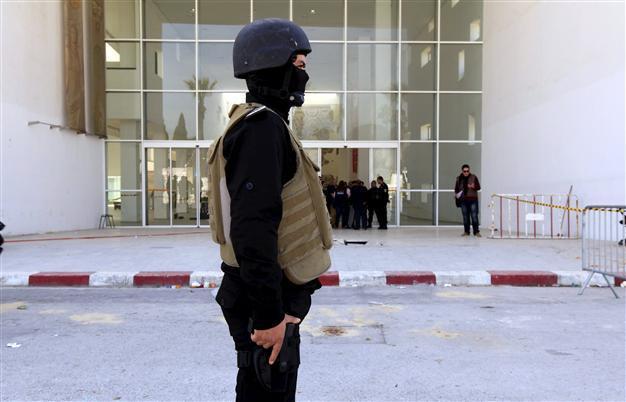ISIL claims deadly attack on Tunis museum
TUNIS - Agence France-Presse

Policemen guard the entrance of the Bardo museum in Tunis March 19, 2015. REUTERS Photo
The Islamic State of Iraq and the Levant (ISIL) claimed responsibility for an attack on foreign tourists at Tunisia's national museum that killed 21 people, as the security forces swooped on suspects.
Authorities said they had identified the two gunmen killed after the Wednesday assault, prompting calls for a show of national unity against extremism in the birthplace of the Arab Spring.
In an audio message posted online Thursday, ISIL said "two knights from the Islamic State... heavily armed with automatic weapons and grenades, targeted the Bardo Museum" in the capital.
The group, which has hundreds of Tunisians among its ranks, threatened more attacks, saying: "What you have seen is only the start."
Authorities say as many as 3,000 Tunisians have gone to Iraq, Syria and Libya to fight in jihadist ranks, raising fears of battle-hardened militants returning home to plot attacks.
The president's office said security forces arrested "four people directly linked to the (terrorist) operation and five suspected of having ties to the cell".
And a presidential source said soldiers were to be deployed in major cities following the assault, while insisting "we are not under siege".
As international outrage grew over Tunisia's worst post-revolution attack, President Beji Caid Essebsi said his country would not be cowed by extremism.
"The process of implementing a democratic system is underway, well anchored," he told France's TF1 television. "We will never move backwards."
The leader of the Islamist opposition party Ennahda, Rached Ghannouchi, said he was convinced that "the Tunisian people will stay united in the face of barbarity".
The media also called for solidarity, with newspaper La Presse appealing for "total unity and a sense of responsibility shared by all".
Panic broke out during the attack Wednesday as gunmen in military uniforms opened fire at visitors as they got off a bus then chased them inside the museum.
The dead included three Japanese, two Spaniards, a Colombian, an Australian, a British woman, a Belgian woman, two French, a Pole and an Italian, Health Minister Said Aidi said.
Dozens more people were wounded in the assault, in a massive blow to Tunisia's heavily tourism-dependent economy.
After cowering in fear in the museum during the night, two Spanish tourists were discovered Thursday alive and well, officials said.
At least two major cruise ship operators suspended stopovers in Tunis following the attack.
Nine of the slain tourists were from the MSC Splendida cruise ship, whose owners said a special psychology unit had been set up for passengers.
The government, in a show of defiance, said the National Bardo Museum would reopen early next week.
Prime Minister Habib Essid named the two gunmen killed by security forces at the museum as Yassine Abidi and Hatem Khachnaoui. He said Abidi was known to the police.
The museum assailants were "probably" Tunisian, the interior ministry added.
President Essebsi said the gunmen had explosives on them and he praised the security forces for preventing further bloodshed.
Tunisia has seen an upsurge in Islamist extremism since the 2011 revolution that ousted longtime strongman Zine El Abidine Ben Ali and sparked the Arab Spring uprisings around the region.
US President Barack Obama called Essebsi to offer condolences and assistance with the investigation as world leaders denounced the attack.
Palestinian Islamist movement Hamas described the shooting as "a crime against humanity".
A retired Colombian general whose wife and son, a dual Colombian-Australian national, were killed, lamented the "irony" of losing them on holiday after spending his life "fighting terrorism" at home.
"Look at the irony of life, all my life I spent in the military fighting terrorism, combating terrorism, and now in a place totally remote from Colombia it takes my wife and son," Jose Arturo Camelo said, according to the Colombian president who called him.
Tunisia has taken pride in forming a democratic government and achieving stability since the Arab Spring -- in marked contrast to countries such as Egypt and Libya.
But dozens of police and military personnel have been killed or wounded in attacks blamed on Islamist militants.
